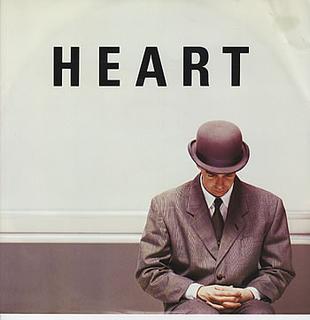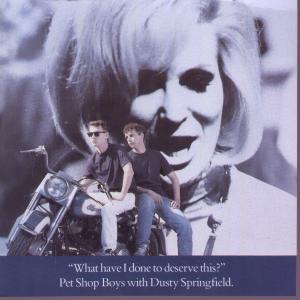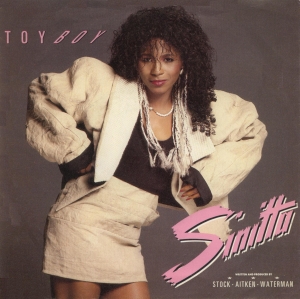"Always on My Mind" is a ballad written by Wayne Carson, Johnny Christopher, and Mark James, first recorded by Brenda Lee and first released by Gwen McCrae in March 1972. Lee's version was released three months later in June 1972. The song has been a crossover hit, charting in both the country and western and pop categories. Elvis Presley's recording was the first commercially successful version of the song.

"Touch Me (I Want Your Body)" is a song by the English pop singer Samantha Fox from her debut studio album, Touch Me (1986).

Johnny Hates Jazz are a British pop band, currently consisting of Clark Datchler and Mike Nocito. In April 1987, they achieved international success with their single "Shattered Dreams".

Turn Back the Clock is the debut studio album by English band Johnny Hates Jazz, released by Virgin Records on 11 January 1988 in United Kingdom and on 29 March 1988 in the United States. The album, whose most famous single was "Shattered Dreams", peaked at number one on the UK Albums Chart and at number 56 on the US Billboard 200. Kim Wilde sings backing vocals on the title track, which reached number 12 on the UK Singles Chart and number 10 in New Zealand. The track "Foolish Heart" was originally released as a single in 1986 as "Me and My Foolish Heart".

"Never Gonna Give You Up" is a song by English singer Rick Astley, released on 27 July 1987. Written and produced by Stock Aitken Waterman, it was released by RCA Records as the first single from Astley's debut studio album, Whenever You Need Somebody (1987). The song became a worldwide hit, initially in the United Kingdom in 1987, where it stayed at the top of the chart for five weeks and was the best-selling single of that year. It eventually topped charts in 25 different countries, including the United States and West Germany, and winning Best British Single at the 1988 Brit Awards. The song is widely regarded as Astley's most popular, as well as his signature song, and it is often played at the end of his live concerts.

"Respectable" is a song by English musical duo Mel and Kim from their only studio album, F.L.M. (1987). It was released on 18 February 1987 as the album's second single. The song reached number one on the UK Singles Chart for one week in March 1987, becoming the second UK number-one single produced by Stock Aitken Waterman (SAW), following Dead or Alive's "You Spin Me Round " (1985), and the first UK number one that the trio had written themselves. The single also topped the charts in many European countries, as well as in Oceania.

"Heart" is a song by English synth-pop duo Pet Shop Boys from their second studio album, Actually (1987). It was released as the album's fourth and final single on 21 March 1988 by Parlophone. The song topped the UK Singles Chart for three weeks in April 1988, becoming the duo's fourth and final chart-topper to date in the United Kingdom. Its music video was directed by Jack Bond and filmed in Yugoslavia. The group had initially written the song for Madonna, though they never asked her to record it, instead keeping it for themselves.
"Don't Leave Me This Way" is a song written by Kenneth Gamble, Leon Huff and Cary Gilbert. It was originally released in 1975 by Harold Melvin & the Blue Notes featuring Teddy Pendergrass, an act signed to Gamble & Huff's Philadelphia International label. "Don't Leave Me This Way" was subsequently covered by American singer Thelma Houston in 1976 and British duo the Communards in 1986, with both versions achieving commercial success.

"Tell It to My Heart" is a song performed by American singer, songwriter and actress Taylor Dayne, originally made by Louisa Florio, released in July 24, 1987 as her first single from her first album, Tell It to My Heart (1988). The single was Dayne's first major exposure, and she soon became known for her up-tempo, dance-oriented music. The song was written by Chappell Music staff songwriter Seth Swirsky and Ernie Gold. Swirsky almost did not deliver the song to his publisher after he and his girlfriend decided it was not good enough.

"What Have I Done to Deserve This?" is a song by English synth-pop duo Pet Shop Boys and soul singer Dusty Springfield, taken from the duo's second studio album, Actually (1987). The song was released as the second single from the album on 10 August 1987.

"Hunting High and Low" is a song by Norwegian band a-ha, released in June 1986 as the fifth and final single from the band's debut studio album of the same name (1985). It became the third most successful single from Hunting High and Low on the charts and one of the band's most recognizable and popular songs. The song did not chart in the United States, but reached the top five in the United Kingdom and Ireland.

"Shattered Dreams" is a song by English musical group Johnny Hates Jazz from their debut studio album, Turn Back the Clock (1988). Written by the band's lead singer Clark Datchler, the song was released in March 1987 as the album's lead single. "Shattered Dreams" entered the UK Singles Chart at number 92 and gained popularity through extensive radio play and video rotation on MTV, eventually peaking at number 5 in May 1987 and spending three weeks at that position.

Clark Wynford Datchler is an English singer-songwriter and record producer. He first rose to fame in 1987 as the lead singer, songwriter and multi-instrumentalist in the pop band Johnny Hates Jazz.

Communards is the debut studio album by British synth-pop duo the Communards, released on 12 July 1986 by London Records. The album was produced by Mike Thorne, who had previously produced lead singer Jimmy Somerville's earlier band, Bronski Beat. Although the singles released ahead of the album were only moderately successful, the first single to be lifted from it after release, "Don't Leave Me This Way", topped the UK Singles Chart for four weeks and became the best-selling single in the UK that year. During the single's four-week run at number one, the album itself peaked at number seven, going on to spend a total of 45 weeks in the UK Albums Chart.

"Toy Boy" is a song by American-British singer Sinitta. Written and produced by Stock Aitken Waterman, it was released on 25 July 1987 and became the fourth single in her self-titled debut album, which came out on 26 December of the same year. It became a hit in the UK and in other European countries where it reached the top ten.

"Turn Back the Clock" is a song by the British band Johnny Hates Jazz. It is the title track of their debut album and was the third single release from the LP.

"Don't Say It's Love" is a song by British band Johnny Hates Jazz, released in 1988 as the sixth and final single from their debut studio album Turn Back the Clock. It was written by Clark Datchler and produced by Calvin Hayes and Mike Nocito. "Don't Say It's Love" reached No. 48 in the UK Singles Chart and remained in the top 100 for three weeks although it did reach No. 40 on the rival Network Chart. The song did not achieve commercial success in Europe, but reached No. 22 on the European Airplay Top 50 chart.

"Crown of Thorns" is a song by English singer-songwriter Clark Datchler, which was released in 1990 as the lead single from his debut solo studio album Raindance. The song was written by Datchler, and produced by Datchler and Humberto Gatica. "Crown of Thorns" peaked at No. 100 on the UK Singles Chart.

"Me and My Foolish Heart" is the debut single by English band Johnny Hates Jazz, released by Rak in 1986. It was written by Phil Thornalley, Calvin Hayes, Iain MacDonald and Mike Nocito, and was produced by Hayes and Nocito. The song was included on the band's 1988 debut album Turn Back the Clock as "Foolish Heart".

"Heart of Gold" is a song by English band Johnny Hates Jazz, released by Virgin in 1988 as the fourth single from their debut studio album Turn Back the Clock (1987). The song was written by Clark Datchler and produced by Calvin Hayes and Mike Nocito. It reached number 19 in the UK Singles Chart and remained in the top 100 for seven weeks.


















